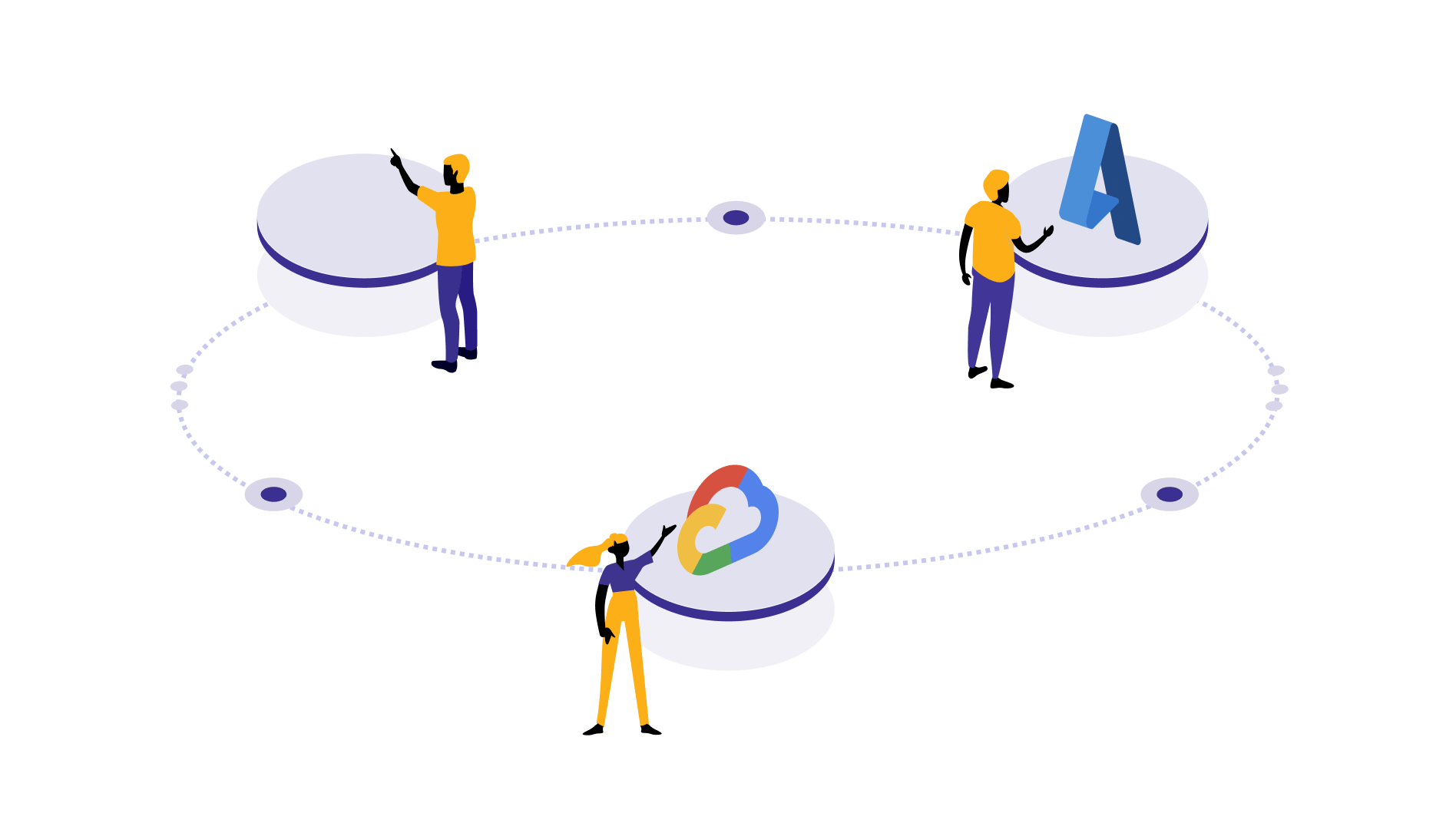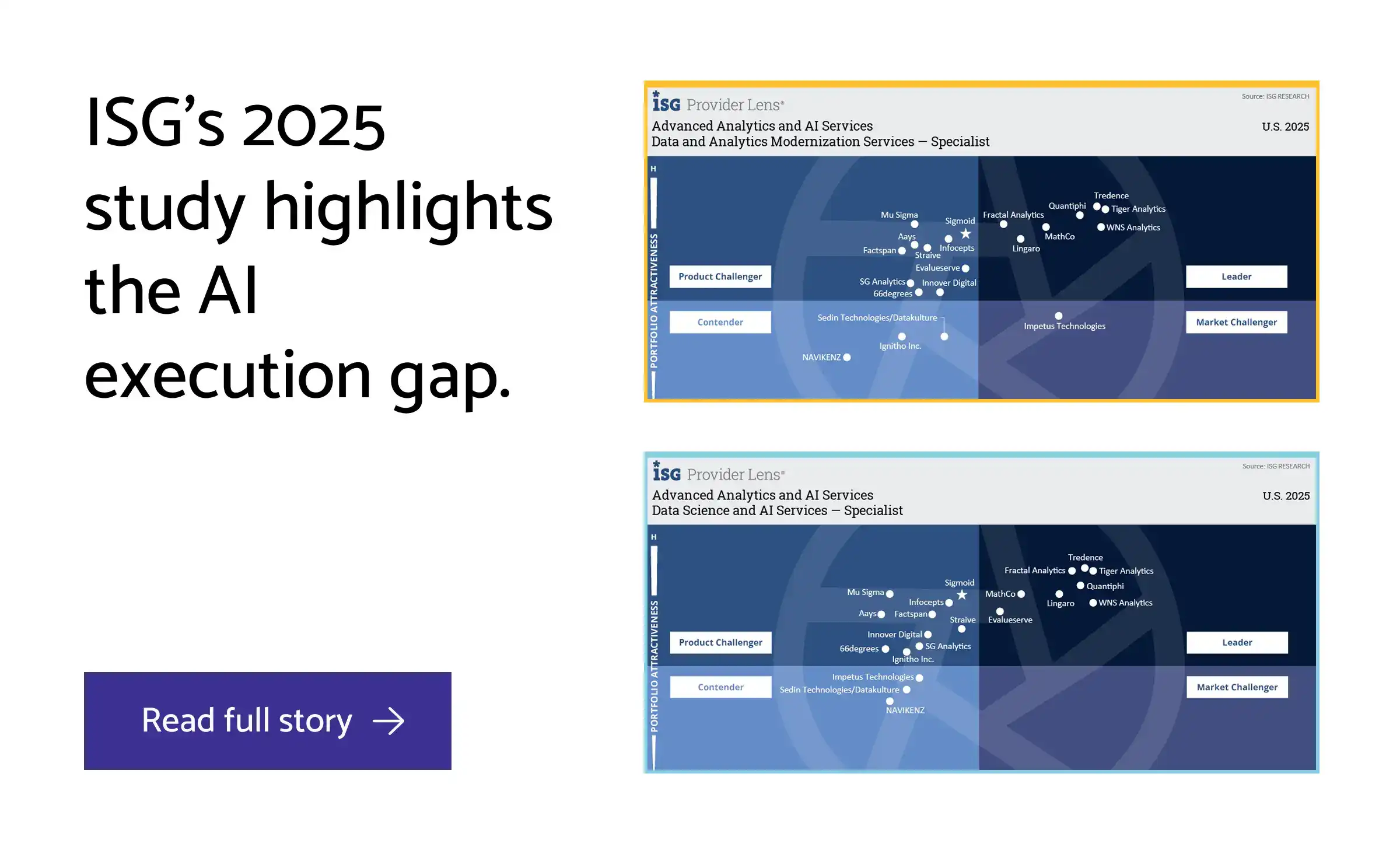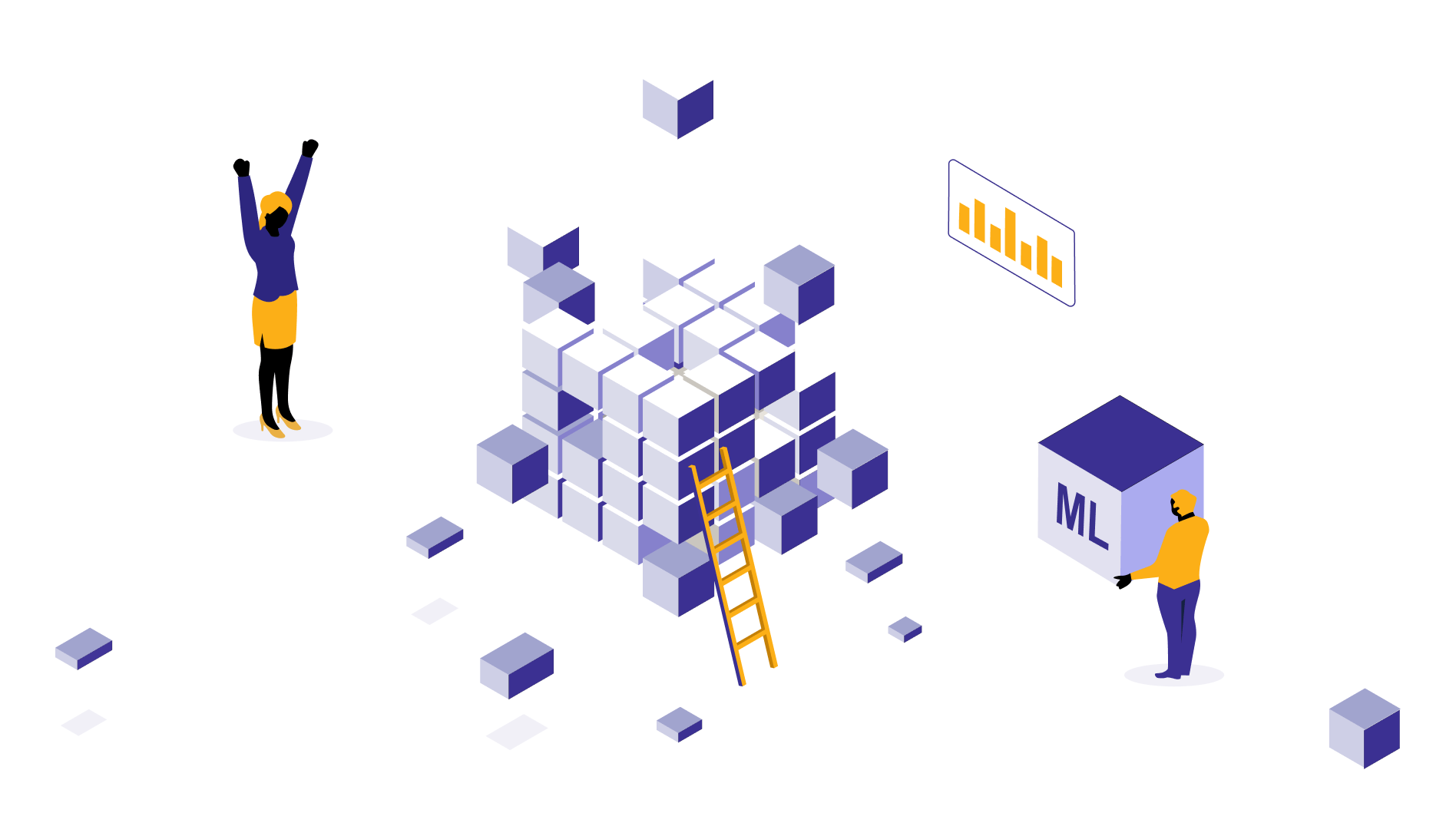Differences between AWS vs Azure vs GCP - What should you choose?
Amazon web services, Google Cloud Platform, and Microsoft Azure are the leading cloud platforms. How do they differ from each other, pricing variations, pros and cons, and what should you choose for your business? The blog has answers to these questions and more.

Suresh
Jan 6, 2026 |
18 mins

AWS vs Azure vs GCP
Cloud platforms offer flexible storage, compute servers and networks, applications, and infrastructure on a pay-as-you-use basis. Currently, three players dominate the market - GCP from Google, Azure from Microsoft, and AWS from Amazon.
As of Q4 2023, Amazon Web Services led the cloud computing market with 31%. Azure stands next with 26% of market share and Google Cloud holds 10%, with an overall cloud market value of $191 billion.
Amazon’s early start around 2006 on business IT infrastructure services is one reason for its large capital share. But is that enough to choose AWS as your cloud provider? Let’s present detailed differences of AWS vs Azure vs GCP for you to get more clarity on this.
AWS vs Azure vs GCP - What’s the difference?
Let’s look at the major factors and differences between cloud providers - AWS, Microsoft Azure, and Google Cloud platform.
Availability
Availability denotes the presence of the physical infrastructure and data centers of the cloud provider across the world. Each zone contains its CPUs, machine types, storage, and power supply, but this general definition might slightly differ for each provider.
AWS:
100+ availability zones all over the world with 220+ network edge locations.
Microsoft Azure:
113 availability zones with one to three in each supported physical region. (51 under development).
GCP:
121 availability zones located in 41 regions and 173 network edge locations.
Services
All the three providers offer compute, storage, network, security, and identity services that slightly differ from each other.
AWS:
It has Amazon Elastic Compute Cloud aka EC2 offering flexible, virtual servers in the cloud. Other popular compute services include Lambda for serverless computing and Beanstalk for app & website infrastructure maintenance, and ECS to handle container services.
AWS’s S3 storage is the leading storage service among all three.
AWS has almost 8 types of database services to suit different requirements. For example, it has Amazon RDS for relational databases, DynamoDB for NoSQL, and Aurora for high performance applications.
To balance load equally across different regions & workloads, AWS has elastic load balancing, VPC network for private cloud hosting, and CDN to manage load speed in content-heavy applications.
Other than these, AWS has firewalls, IAM to manage accesses, and shields for DDoS protection.
Compared to other cloud providers, AWS offers a wider range of services that are highly matured.
Microsoft Azure
Similar to AWS, Azure has an array of services too. For computing, it has Kubernetes services, virtual machines for Windows and Linux VMs, batch, and cloud services, and more like this.
Azure segments the storage for different needs. Blob storage for unstructured data, data lake and disk storage for high performance, HPC Cache for file caching.
Its database services are quite popular, like Cosmos DB that comes with multi-modal capabilities, Synapse for data analytics, ADF for data integration, and Azure database for MySQL workloads.
To manage network, it offers load balancers, virtual networks, app gateways, DNS, and more. Its ExpressRoute is great for fast private network connections suitable in hybrid setups.
You could securely and seamlessly connect Azure with any other Microsoft services. Like AWS, Azure also offers key vault, active directory, and DDoS protection.
GCP
While GCP might be far behind from both the above in the number of services, it still has essential cloud products required for businesses. It has Google Cloud Engine for creating virtual machines, GCP has Google Kubernetes services to manage container orchestration, app engines, and cloud functions for serverless computing.
Google cloud storage is preferable for you, if you are already using Google suite apps. It also has block and file storage options.
GCP renders Google Cloud SQL for traditional databases and Bigtable for NoSQL services.
Its networking services are much similar to its counterparts - load balancers, virtual private cloud, and CDN. One notable part is the Interconnect, offering high-bandwidth private connections.
For security and risk management, you get Security Command Center along with Google Cloud IAM, Key management services, and more.
Pricing
Each cloud provider has a slightly different pricing structure. Depending on your business, data workloads, and IT budgets, you could pick one. Highlighting pricing plans of all cloud providers below:
AWS
AWS has announced pay per second for the consumed capacity consumed for on-demand instances. Other than that, they have a pay-per-hour plan too.
You could also go for spot or reserved instances if you cut down on unused instances and get up to 75% discount on overall compute costs. Other than that, they have dedicated hosts for physical servers and capacity reservations for critical servers and disaster backups.
AWS storage prices start from $0.023 per GB for the first 50TB, depending on the storage size and duration. They offer multiple classes which you could choose based on the expected performance, latency, and availability.
Other than that, AWS has free tiers too for new users to explore their platforms. Check out their pricing calculator here.
Microsoft Azure
Microsoft Azure’s pricing is more or less similar to AWS. Like AWS, they have pay-as-you-go, reserved instances, spot instances, and free tier models. Similar to AWS, Azure also charges per hour or second usage and up to a 90% discount on compute costs for Spot VMs.
But with Azure, you also get hybrid benefit, where existing Microsoft Windows server/SQL server customers could save your IaaS and PaaS cloud costs when they migrate to Azure.
Storage prices start with $0.0184 per GB for the first 50TB. Similar to AWS, Azure has three tiers for storage - hot, cold, and archive tiers.
Its best part is more predictable costs for companies already on Microsoft ecosystem (Office 365, Dynamics, SQL Server). Azure Hybrid Benefit saves up to 40% by reusing on-prem licenses.
GCP
On-demand model: Pay per query ($5 per TB scanned) and flat-rate model where you pay a fixed monthly fee for dedicated query capacity.
Simplified pricing, pay only for the resources you consume (compute seconds, storage GBs, queries run), without upfront costs or long-term contracts.
Sustained use discounts and committed use discounts. For example, if a VM runs more than 25% of the month, the price drops automatically. Similarly, committing to a resource for 1 to 3 years can bring up to 70% discounts. Making it much more suitable for startups and AI-heavy companies.
There are always free products too, and you get a 12-month free trial with $300 credit.
AI, ML, and data analytics
AWS
Has the highest scope for AI and ML initiatives with tools like SageMaker for model training and development, Comprehend for NLP, Rekognition for vision, Forecast, Lex for conversational AI).
Similarly, for data analytics, AWS offers Athena for SQL over S3, Redshift for warehousing, Glue for ETL, and Kinesis for streaming.
The major challenge is that there are too many overlapping services and that it requires skilled technicians to handle.
Azure
Has managed services for AI and ML development including Azure machine learning, cognitive services, and Azure Open AI services. If you want to incorporate GPT-based LLM into your processes, Azure works better than GCP and AWS.
For analytics workloads, Azure has Synapse Analytics (DW + big data), Data Lake, and Microsoft Fabric for unified data + AI, and Power BI for visualization and analytics.
If you are already using Microsoft ecosystem, then Azure has everything you need – from compliance to integration to ML.
Only challenge is that Azure services aren’t as developer friendly as of GCP.
GCP
GCP has services related to AI and ML like Tensorflow, Vertex AI, and Google AI platform. Similarly, has PaLM 2, Gemini, and Vertex AI for Gen AI solutions development. Organizations using GCP for AI have highlighted that this is strong in computer vision, speech, translation, etc.
BigQuery and Dataflow for data analytics, serverless data warehousing, stream data processing, and more.
GCP is great for companies going for data science and innovation but has fewer industry-specific AI services compared to AWS.
Storage
AWS
AWS offers a great range of storage options: S3 (object storage), EBS (block storage for EC2), EFS (file storage), Glacier (archival storage), whereas S3 is considered the gold standard for cloud storage.
Preferred by industries and enterprises with global reach, durability, and those with multiple storage tiers.
Retrieval and egress costs can quickly add up fast.
Azure
Azure also has lots of services for storage: Blob Storage (object), Azure Files, Azure Disks, Archive Storage which also integrates tightly with SQL Database and Azure Data Lake Storage.
Works seamlessly with other Microsoft products and SQL workloads can be migrated easily without friction.
If your company has plans to go hybrid, Azure storage is the best choice. Similarly, if your business has larger amounts of SQL workloads, then SQL or hybrid on-prem/ cloud environments.
GCP
GCP is the third-popular cloud storage services provider with simplest storage services: Google Cloud Storage (object), persistent disk (block), Filestore (file), Nearline/Coldline/Archive (archival tiers).
GCP for storage is preferrable if you want storage and analytics suite together, since GCP offers Storage + BigQuery together.
But if you want enterprise-level features, GCP may not be the right answer, as it doesn’t have much compared to AWS.
So, if you don’t need enterprise-level features and scalability, and are looking for simple, analytics-based storage solutions, GCP is better than its competitors.
Factors | AWS | Azure | GCP | Architect’s note |
|---|---|---|---|---|
Pricing | Extremely granular, many levers (on-demand, Savings Plans, Spot). Powerful but easy to misconfigure; strong FinOps tooling needed. | Competitive, predictable for Microsoft shops (Hybrid Benefit, Windows/SQL licensing). Some egress surprises. | Simplest mental model: sustained-use (auto) + committed-use discounts; Preemptible VMs are very cheap; BigQuery pay-per-query can be cost-efficient for analytics. | If you don’t have a FinOps motion, GCP is easiest; if you do, AWS can be the most tunable; Azure wins when you’re already licensing Microsoft. |
AI/ML & Data Analytics | SageMaker, Bedrock, Kinesis, Glue, Athena, Redshift. Mature MLOps; steep learning curve. | Enterprise-governed AI: Azure ML + Azure OpenAI, Synapse/Fabric; tight AAD/Compliance story; great with Power BI. | Data-native: Vertex AI (clean E2E), BigQuery (serverless DW), Dataflow. Fast path from notebooks to prod; strong gen-AI tooling. | Choose AWS for service breadth, Azure for regulated/Office-centric orgs, GCP for teams prioritizing ML productivity + analytics speed. |
Storage | S3 is the baseline; many classes (Standard, IA, Glacier tiers). EBS/EFS round out block/file. | Blob/ADLS Gen2 integrate well with Synapse/Fabric; Azure Files/Disks for file/block. | Cloud Storage with clear classes (Standard, Nearline, Coldline, Archive); simple lifecycle rules. | All three are durable and elastic. AWS has the most tiers; Azure plays best with its analytics stack; GCP is the most straightforward to reason about. |
Availability & Regions | Largest global footprint; multi-AZ by design; rich cross-region options. | Broad global coverage; strong sovereign/government options; hybrid via Arc/Stack. | Fewer regions than AWS/Azure but growing; multi-region primitives are solid. | If region choice and specialized sovereign needs matter, Azure/AWS lead; GCP is fine for most global footprints. |
How wide are the core services? | Widest catalog; multiple overlapping services per problem (power + complexity). | Very broad; deep Microsoft integration (AAD, Windows/SQL, M365). | Leaner catalog; tends to ship opinionated, managed services over many variants. | AWS = every knob; Azure = integrated enterprise platform; GCP = fewer choices, faster adoption. |
Security & IAM | Fine-grained IAM; mature KMS, Private link. Powerful but complex policy modeling. | Azure AD (now Entra ID), RBAC aligned with enterprise identity; Purview helps with data governance. | Simpler IAM model; org-policy guardrails; VPC-SC for data perimeter. | Azure wins in Microsoft-centric identity; AWS wins on depth; GCP best for clean guardrails with less policy sprawl. |
Companies that uses the AWS, Microsoft Azure and GCP
AWS
Often widely used and mentioned in interviews and expert opinions, AWS is used by many popular companies like Netflix, Coinbase, Coursera, etc. Here is the detailed list of companies that are set up on or migrated to AWS cloud.
Companies | AWS and why they use it? |
|---|---|
Netflix | Migrated by 2016 to handle the streaming data demands. |
Sony, Adobe, Twitter, Reddit, Samsung, Walt Disney | Major spenders on AWS for its compute and other services |
BMW | Has set up AI-driven vehicle experience across 22 million cars with the help of AWS |
Pfizer, Nasdaq, Allen Institute for Brain Science | Uses AWS to run data-driven genomics, AI-powered medical insights, etc. |
Coinbase | Uses AWS for crypto digital infrastructure scaling. |
If you’re planning to choose AWS, our AWS consulting services can help you design, migrate, and optimize your cloud infrastructure.
Azure
Azure is mainly used by enterprises and organizations depending on Microsoft products.
Companies | Azure and why they use it? |
|---|---|
Walmart | Enterprise level analytics and AI |
Public sectors like NHS (UK) | Has set up Azure services for security and compliance |
Mitsubishi, Renault, Bosch, Audi, and similar companies | For cloud based data transformation, enterprise level AI, and more. |
Starbucks | Uses Azure Sphere and Green Dot Assist AI for data analytics, cloud transformation, and AI-powered barista operations. |
GCP
Fast-growing organizations mainly use GCP with heavy dependencies on analytics and AI. An interesting fact is that nearly 90% of generative AI unicorns and over 60% of funded genAI startups run on Google Cloud.
Companies | GCP and why they use it? |
|---|---|
eBay, PayPal, LinkedIn, Verizon, etc | Use GCP for data storage, management, and end-user analytics |
Walmart, CVS health, etc | Use GCP for app hosting and analytics |
Government of Kuwait, Deutsche Börse, etc. | Use GCP as innovation and AI partner. |
Pros and cons of 3 cloud providers
AWS: Pros and Cons
Pros
AWS is one of the largest cloud provider with the broadest service catalog, that spans across compute, storage, AI, IoT, and DevOps.
Global reach: largest number of data centers and availability zones.
Mature ecosystem and talent pool — easier to hire AWS-skilled engineers.
Cons
Pricing complexity. It’s difficult to understand overlapping services and respective costs, which leads to “bill shock” without strong FinOps discipline.
Service sprawl: overlapping tools make architecture harder to manage.
New teams take time to learn and mature.
Azure: Pros and Cons
Pros
Best for enterprises already using Microsoft tools (Office 365, Dynamics, SQL Server).
Strong hybrid cloud offering (Azure Arc, Stack) for gradual migrations.
Enterprise-grade compliance, security, and identity management (Azure AD).
Cons
Some services aren’t as mature as their AWS counterparts.
Hidden networking/storage costs. Its pricing model could be slightly opaquer.
Regular users also report inconsistent support experience.
GCP: Pros and Cons
Pros
Simplest and most transparent pricing (sustained/committed use discounts).
Best-in-class data analytics and AI platforms.
Developer-friendly.
Cons
Smaller global footprint than AWS or Azure (though growing).
Smaller enterprise adoption base, so fewer trained professionals.
How to choose the best cloud provider for your company?
Sharing our expertise on how you can select one among AWS, Azure, and GCP based on our 10+ years of experience helping companies set up, migrate, and scale their data infrastructure.
First of all, let’s break this myth. There is no single ‘best cloud provider’ in the world. Everyone has their own strengths and areas-to-work-on. So, it’s about finding the best fit for your business model, ecosystem, and goals.
Since, we have already covered the competitive strengths and how to select, combining that here to highlight which cloud provider to for, depending on a few factors.
Pick AWS if you want a wide range of services, have a business with global branch and reach, and are ready to hire a large team to manage complexity.
Choose Azure if your enterprise is Microsoft-heavy, needs hybrid flexibility, and prioritizes compliance.
Opt for GCP if your edge is data analytics, AI/ML innovation, or if you want pricing transparency and developer speed.
If you need someone who can sit with you, guide you in selecting the best cloud provider, while designing the basic architecture, then talk to our solution architect through free consulting. Share your requirements through ‘contact us’ page.

by Suresh
Suresh, the data architect at datakulture, is our senior solution architect and data engineering lead, who brings over 9 years of deep expertise in designing and delivering data warehouse and engineering solutions. He is also a Certified Fabric Analytics Engineer Associate, who plays a major role in making us one of the early adopters of Fabric. He writes in words whatever he delivers with precision to his clients, consistently voicing out trends and recent happenings in the data engineering sector.



